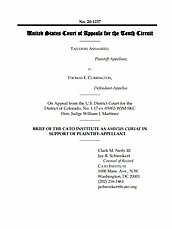Learn more about Cato’s Amicus Briefs Program.
The First Amendment guarantees the right to the free exercise of religion, and the Fourteenth Amendment prevents the state from discriminating against citizens solely because of their religious beliefs. Citizens do not forfeit these rights simply because they are incarcerated. While the accommodation of prisoners’ religious beliefs may sometimes present difficult questions, one axiomatic legal principle is that prisoners cannot be punished or denied the free exercise of religion, simply because a prison official harbors animus toward their particular religion. But Tajuddin Ashaheed was the victim of exactly this sort of invidious religious discrimination – and because of the doctrine of qualified immunity, he was left without any legal remedy.
Mr. Ashaheed is a practicing Muslim who observes the “Sunnha” practice of leaving his beard to grow, and he deeply believes that shaving his beard violates a core tenet of his faith. In July 2016, Ashaheed appeared at the Colorado Department of Correction (“CDOC”) to begin a ninety-day sentence for a parole violation. The CDOC was aware of Ashaheed’s religious affiliation, and while prisoners were generally required to submit to beard shavings, this policy specifically exempted anyone with a sincere religious objection. But Thomas Currington, the sergeant handling Ashaheed’s intake process, ordered Ashaheed to shave his beard regardless. Currington bizarrely (and incorrectly) told Ashaheed he needed a “full beard” to qualify, and when Ashaheed tried to explain that he’s physically unable to grow a full beard, Currington said he “didn’t want to hear about it.” Currington then threatened to have Ashaheed “thrown in the hole” (solitary confinement) if he didn’t submit to shaving his beard, which Ashaheed then did.
After Ashaheed was released, he filed a Section 1983 suit against Currington, alleging that Currington violated his constitutional rights under the First and Fourteenth Amendments. The District Court agreed that Ashaheed had sufficiently pled a First Amendment violation, accepting his allegations that Currington’s actions were designed to disrupt his religious practices and intentionally directed at him due to Currington’s hostility toward Islam. Nevertheless, the court held that Currington was entitled to qualified immunity because Ashaheed had failed to identify a prior case specifically holding that coercing a prisoner into shaving his beard for no reason other than religious animus was unconstitutional. Therefore, in the court’s view, Ashaheed’s rights were not “clearly established.”
Cato has filed a brief in support of Ashaheed’s appeal to the Tenth Circuit. The doctrine of qualified immunity itself is fundamentally at odds with both the text and history of Section 1983, but even taking that doctrine as a given, the district court failed to apply it correctly. Although the Supreme Court has emphasized that clearly established law must be “particularized” to the facts of a case, it has also said that a case with fundamentally similar facts is not always necessary. Rather, the more obviously egregious the constitutional violation, the less specificity is required from prior case law to clearly establish the violation. No reasonable person in Currington’s position could have possibly thought it was constitutional to force a prisoner to shave his beard out of anti-Muslim animus, so he is not entitled to qualified immunity.

This work is licensed under a Creative Commons Attribution-NonCommercial-ShareAlike 4.0 International License.



